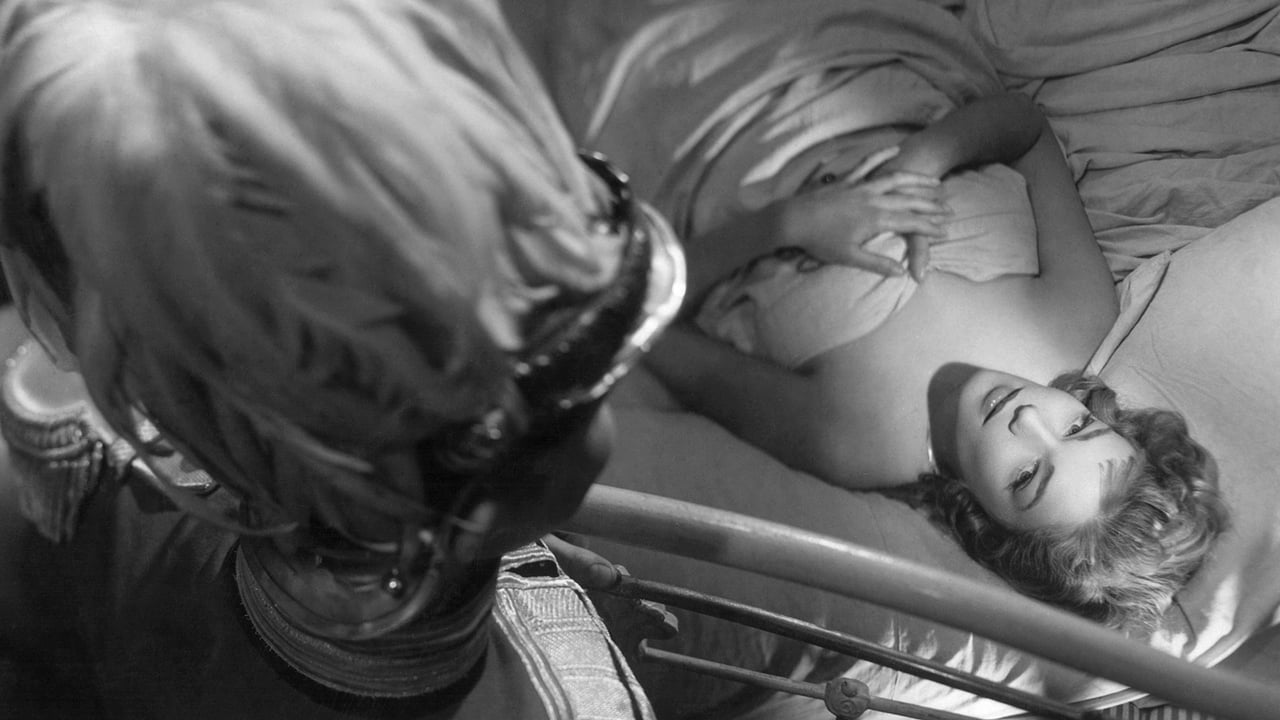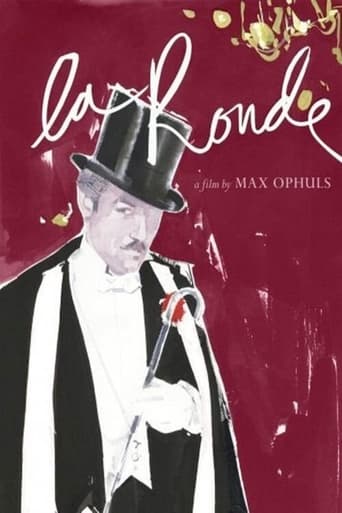

I like to avoid films that are too "theatrical" and/or "musical." This film is one of the few that showed me the there is a way to make the combination intriguing. I loved the self-conscious narrator. Despite the annoying singing (imo), he is a comic relief. He makes you take another look at the sequence before and after his appearance. Yes, there are symbolism and commentary in the film. But noticing these is not necessary to enjoy the wonderful cyclical visual storytelling. As the narrator says we are here for "the love of art of love" or the dirtiness of it depending on which way you look. Simple and masterful enough. I agree with the other commenters praising Ophüls' style.
... View More'La Ronde' occupies a special place in the filmography of Max Ophuls. Before this film nobody had dared to carry out an extensive study about love and sex. It is not a mere coincidence that 'La Ronde' finds some sort of an echo in the writings of Italian writer Alberto Moravia. According to him there can be sex without love but hardly sentimental love without sex. Max Ophuls shows the thin line which separates love from sex. It is a marker used by him to differentiate between various dichotomies namely rich and poor, sacred and obscene. The Facial expressions of all actors have been nicely filmed as their frustrations are clearly visible. While watching different episodes of 'La Ronde', viewers are constantly reminded of the fact that the notion of love does not remain same in the context of a relationship between a man and a woman. Lastly, 'La Ronde' remains a grim reminder of the fact that social conventions were challenged and a lot of people from all strata of society were involved in the spreading of illicit love. All this happened at a time when nobody was alien to other person's secrets.
... View MoreYes, this movie is based on overt sexual tendencies; there is no argument there. What is so amazing about this movie is the cinematography. Ophuls created so many sweeping shots, so well, using only a camera on a track. This is an amazing feat. Also this movie echoes a lot of Freud. Remember, Ophuls is German and certainly read Freud during his life.One of Freud's greatest works involving psychoanalysis is parapraxes, or slips of the tongue. In La Ronde, parapraxes play a major role, for parapraxes also apply to misplacement of items (and people). For every love, there is another lover. Freud would say that no matter how much you love your partner, there is a better partner for you out there. A partner that the second you see, you will become instantly infatuated with. La Ronde does an excellent job of this.
... View MoreI've just read all the previous comments on this and I'm surprised that none of them apparently grasped that the main thrust of the plot was the passing of venereal disease from one character to another. It's not just coincidence that the first coupling is between a prostitute and a soldier - prostitutes traditionally work near army barracks and are, or arguably were in 1900, more likely to be carriers of venereal disease than most other women simply because by definition they had sex with more men than the average woman, married or single, in 1900. The vastly overrated semi-Amateur film maker Jean-Luc Godard dismissed both the film and one of France's leading actors (Gerard Philippe) with the words 'France's worst actor in France's worst film', which in itself should be sufficient to send all intelligent people flocking to see La Ronde. It is, of course, dated. It has to be, it was made 54 years ago yet it still retains that quality that has always eluded and will always elude Godard, Style. What if not stylish should we call it when our self-appointed narrator, Anton Walbrook, discards his slightly down-market raincoat and dons an opera cape to lead us to a sleazy quarter of Vienna and make us privy to the initial sexual encounter, the first, of course, of many, between prostitute Simone Signoret and soldier Serge Reggiani (soon to play similar roles in Jacques Becker's 'Casque d'Or') and provide the first 'take' on love/sex which is indifference; even when Signoret is prepared to waive her fee Reggiani disdains free sex on the grounds that her room is a ten minute walk from where they met and only reluctantly does he finally agree to an al fresco coupling from which he hurries away with barely a 'thank you', let alone a cigarette. Cynicism is still rampant in the next encounter in which Regginani seduces Simone Simon's comely housemaid then hurries back to the dance where they had met. Cynicism of a different sort informs the next encounter when the young man of the house (Daniel Gelin) where Simon is employed practices his seduction technique on her before attempting it with the real thing in the shape of older, married Danielle Darrieux. This episode, together with its successor (Darrieux and her husband, Fernand Gravey) serves as a filmic equivalent of an interval in a theatre (the film is based, as is widely known, on a play by Viennese playwright Artur Schnitzler)and Gelin's initial impotence is metaphored subtly (for 1950) by the breaking down of the roundabout which allows Ophuls to cut away to Walbrook in mechanic mode and then back to a now successful Gelin consummating his infatuation for Darrieux. And so it goes on, brief encounters, longer liaisons, just like life in fact. Virtually all of the cast had or would appear in classic films, not least Jean-Pierre Barrault, so memorable in 'Les Enfants du Paradis', Gerard Philippe, the original 'Fanfan le Tulipe' with 'Les Orgueillex' still to come, Serge Reggiani, a veteran of 'Les Portes de la Nuit', laughed off the screen in 1946 and now regarded rightly as a masterpiece, and so on, arguably only Isa Miranda as the actress let the side down. All in all a triumph. 8/10
... View More